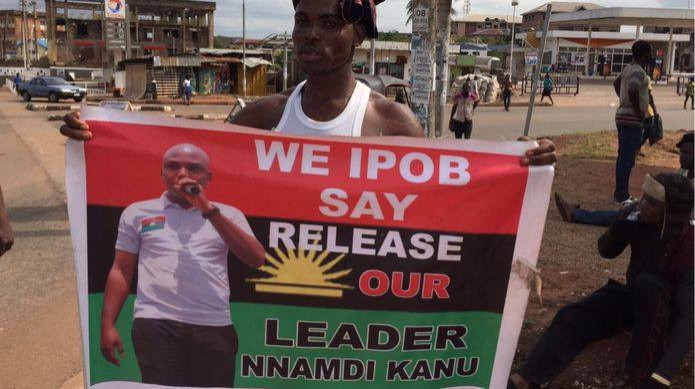Nnamdi Kanu: Pro-Biafran groups claim no peace talks unless Ipob leader is released

Pro-Biafran groups have rejected calls by government members to start a dialogue on the issue of Biafra. Both the Indigenous People of Biafra (Ipob) and the Movement for the Actualization of the Sovereign State of Biafra (Massob) said no talks will occur unless the government releases Ipob leader Nnamdi Kanu.
Pro-Biafrans call for the independence of territories that constituted the Biafran Republic, established in 1967 and reannexed to Nigeria in 1970, following a civil war that claimed between one and three million lives. Following Kanu's arrest, rallies have instensified across southeastern Nigeria. A 2 December protest in Onitsha, Anambra state, resulted in the alleged death of at least nine demonstrators. The police, however, denied they opened fire on civilians during an interview with IBTimes UK.
A few days after the Onistha incident, Nigerian politicians and elite members held a discussion on the Biafra issue. The talks took place in the federal capital of Abuja and were chaired by Nigerian politician and former UN representative Maitama Sule. Former governor of Akwa-Ibom State, Senator Goodswill Akpabio, participated as a guest speaker.
During the discussion, participants agreed on the need to address the issue peacefully to avoid another civil war. Speaker Bello Kirfi, who represented the north-east, told leader from the south-east to "go back and let the people know that their approach is wrong," The Premium Times reported.
However, pro-Biafra argued that the only person whom the Nigerian government should negotiate with is Kanu. The controversial director of London-based Radio Biafra was apprehended in Lagos in October on charges of criminal conspiracy, intimidation and belonging to an unlawful society. He pleaded not guilty. His trial has been adjourned to 14 December.
An Ipob coordinator who lives in Anamabra said that the government is speaking to the wrong people. The source said: "Unless, he [President Muhammadu Buhari] releases Nnamdi Kanu, no dialogue will hold with Ipob representatives in attendance."
Massob and Ipob
Massob and Ipob have claimed several times they are not related. Both movements accuse each other of violent propaganda and actions. According to Ipob members, violent actions blamed on Massob smear pro-Biafrans' reputation and are used by the government to claim the whole movement is violent.
The Nigerian government has deemed Massob as an extremist group. Its leader Ralph Uwazuruike was arrested in 2005 on treason charges. He was released two years later.
Uwazuruike announced on 6 December the group had been renamed Biafra Independent Movement, BIM. He explained the decision was necessary following violent actions by internal dissidents.
He said during a press conference in Owerri, capital of Imo state: "The change in name became absolutely necessary because of the sad introduction of violence by the disgruntled dissidents and this is at variance with the non-violence stance of Massob over the years."
Uwazuruike also alleged he had recruited Kanu in 1989 and appointed him as the director of Radio Biafra. "He started preaching hatred and brainwashing the youths. Massob sacked him." Ipob denies the allegations.
Immanu-el Yahgozie, editor at Biafra 24, told IBtimes UK: "We are not involved in any negotiations and we will not get involved until Kanu and Benjamin Onwuka [leader of the Biafra Zionist Movement] are released."
IBTimes UK has contacted Massob for a statement, but had not received a response at the time of publishing. The group's director of information, Edson Samuel, was quoted by the Vanguard as saying: "Any person moving to dialogue between us and Federal Government must first meet with us and know our demands."
Meanwhile, Washington-based NGO Organization of Emerging African States (Oeas) – which advocates for people's right to self determination – warned that Nigeria could risk a "civil strife" if pro-Biafrans' demands are not met.
In a statement released on 4 December, the organisation also said Nigeria should hold a referendum on the Biafra issue within 90 days with independent observers supervising the polls.
Buhari has not yet made any comment on the ongoing calls for independence and referendum. Earlier this year, a spokesperson for the government told IBTimes UK that it does not consider the separatist movement a threat to the current leadership and defined pro-Biafrans as an "insignificant number of frustrated people who are not a threat to the existence of Nigeria".
Earlier in December, the minister of information, Lai Mohammed, urged Nigerian leaders to defend the unity of the country but said pro-Biafran demonstrators are completely legitimate.
© Copyright IBTimes 2025. All rights reserved.





















